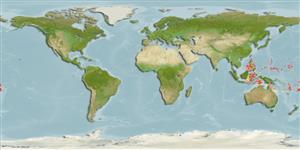Teleostei (teleosts) >
Perciformes/Scorpaenoidei (Scorpionfishes) >
Scorpaenidae (Scorpionfishes or rockfishes) > Scorpaeninae
Etymology: Pteroidichthys: Greek, pteron = wing, fin + Greek, ichthys = fish (Ref. 45335); acutus: Name from Latin 'acutus' meaning sharp; referring to having the longest and sharpest snout of species in the genus Pteroidichthys..
Environment: milieu / climate zone / depth range / distribution range
Ecology
Marine; pelagic-neritic; depth range 73 - 400 m (Ref. 106976). Tropical; 20°N - 27°S, 115°E - 178°W (Ref. 106976)
Distribution
Countries | FAO areas | Ecosystems | Occurrences | Point map | Introductions | Faunafri
Western Pacific: from the Philippines, Vanuatu, and the Wallis and Futuna Islands.
Size / Weight / Age
Maturity: Lm ? range ? - ? cm
Max length : 4.1 cm SL male/unsexed; (Ref. 106976)
Short description
Identification keys | Morphology | Morphometrics
Dorsal spines (total): 7; Dorsal soft rays (total): 9; Anal spines: 3; Anal soft rays: 5. This species is distinguished by the following characters: A III.5; rigid dorsal-fin spines; relatively long snout with length 18.0-21.2% (mean 19.6%) of SL, and is longer than postorbital length; posterior margin of maxilla just reaching to or short of vertical through the anterior margin of pupil; the distance between tips of lateral lacrimal and first suborbital spines is longer than that between tips of first and second suborbital spines; presence of supplemental preopercular spine; tentacles on supraocular and posterior lacrimal spines are poorly developed, lengths are less than orbit diameter; with few tentacles on trunk and fins; lateral lacrimal and suborbital spines are well developed, with pointed tips; membranes between last spine and fourth soft ray of dorsal fin with a large black blotch (Ref. 106976).
Most probably found on sandy bottoms (Ref. 106976).
Life cycle and mating behavior
Maturities | Reproduction | Spawnings | Egg(s) | Fecundities | Larvae
Motomura, H. and Y. Kanade, 2015. Review of the scorpionfish genus Pteroidichthys (Scorpaenidae), with descriptions of two new species. Zootaxa 4057(4):490-510. (Ref. 106976)
IUCN Red List Status (Ref. 130435)
Threat to humans
Harmless
Human uses
Tools
Special reports
Download XML
Internet sources
Estimates based on models
Phylogenetic diversity index (Ref.
82804): PD
50 = 0.5625 [Uniqueness, from 0.5 = low to 2.0 = high].
Bayesian length-weight: a=0.01259 (0.00606 - 0.02615), b=3.03 (2.86 - 3.20), in cm total length, based on LWR estimates for this (Sub)family-body shape (Ref.
93245).
Trophic level (Ref.
69278): 3.3 ±0.4 se; based on size and trophs of closest relatives
Resilience (Ref.
120179): High, minimum population doubling time less than 15 months (Preliminary K or Fecundity.).
Fishing Vulnerability (Ref.
59153): Low vulnerability (10 of 100).
